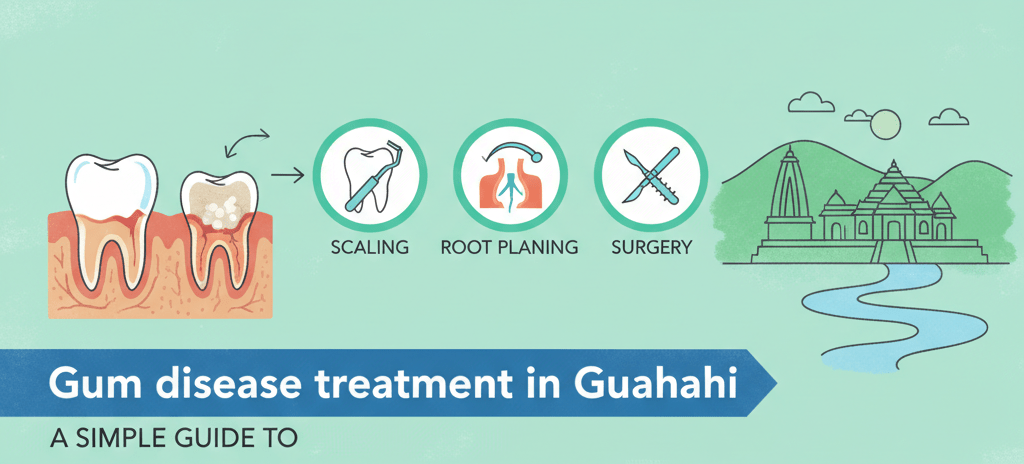If your gums bleed when you brush or you notice a dull ache around a few teeth, do not wait. Many people in our city brush the blood away, drink some water, and move on with the day. That small sign is often the first step toward a bigger problem. This guide explains how gum disease starts, what gum disease treatment in Guwahati usually involves, and how you can keep your gums steady for the long run.
What is really happening inside the gums
Gum disease begins when soft film sits on the teeth near the gum line. Over time that film turns into hard deposits. The body reacts with swelling and bleeding. Early changes are called gingivitis. If the film and deposits stay for months, the attachment around the tooth can weaken. Pockets form. That stage is called periodontitis. At this point, gum disease treatment in Guwahati needs more than a quick polish. It needs a clean out that reaches under the gum line.
When a routine clean is enough and when deeper care is needed
For fresh bleeding without deep pockets, the dentist may suggest teeth cleaning in Guwahati with a focus on the edges near the gums. This is also called scaling. A routine session removes deposits above the gum line and light stain. It works well when pockets are shallow and your daily care is already good.
If bleeding continues or pockets measure more than a few millimetres, the dentist may recommend scaling and root planing in Guwahati. People also call this deep cleaning in Guwahati. The aim is to go below the gum line and clean the root surfaces so the gum can re attach and calm down. This is a careful process. Numbing gel or local anaesthesia is used when needed, and the dentist often treats the mouth in sections over one or two visits. This level of periodontal treatment in Guwahati has the best chance of stopping early bone loss and getting the gums back to firm and pink.
Sometimes pockets stay deep or the shape of the roots makes cleaning difficult. In those cases the dentist may discuss gum surgery in Guwahati. Surgery opens the area so the roots can be cleaned and shaped with better visibility. It can also reshape the gum and bone so the pockets do not collect debris again. Not everyone needs surgery. A good response to scaling and root planing in Guwahati often avoids it.
What to expect during care
Before any gum disease treatment in Guwahati the dentist will measure pocket depths and record bleeding points. These numbers are your starting map. Expect pictures and a few small X rays to check bone levels. For teeth cleaning in Guwahati the session is steady and calm. You will hear gentle tapping and washing sounds as the deposits come off. For deep cleaning in Guwahati you will feel pressure and cool water, but pain control keeps you comfortable. After the visit the gums may feel tender for a day or two. Rinse with warm salt water, keep brushing with a soft brush, and follow the cleaning routine your dentist sets.
For gum surgery in Guwahati the team will explain the steps, the time needed, and home care. You will go home on the same day with simple instructions and a review date. Many people notice that food does not collect as much after surgery because the pocket entrances are smaller and smoother.
Costs and value in our city
People often ask about dental scaling price in Guwahati. Prices vary with time, deposits, and the number of teeth that need work. A routine cleaning is one level. Scaling and root planing in Guwahati is another level because it involves careful work below the gum line and may need more than one session. Gum surgery in Guwahati has its own bands based on the number of teeth, the type of reshaping, and the materials used. A clear estimate before you start keeps choices easy. The real value comes from what you prevent. Stopping gum disease early saves teeth, reduces bad breath, and keeps future treatment simple.
Daily habits that support healing
Any periodontal treatment in Guwahati works best when home care is consistent. Use a soft brush twice a day. Angle the bristles toward the gum line and use small strokes. Clean between teeth once a day with floss or small brushes if your dentist suggests them. Rinse after sweet snacks and after tea or coffee. Drink water through the day. If you smoke, ask for help to quit. Smoking slows healing. After scaling and root planing in Guwahati the gums need calm days with gentle cleaning. Avoid hard seeds and very sticky foods for a short while.
When to see a periodontist
Most clinics handle early and moderate cases well. If pockets remain deep, if a few teeth are loose, or if you have diabetes with slow healing, ask for a visit with a periodontist in Guwahati. A specialist can plan surgery if needed, or use advanced cleaning tools around complex roots. You can still return to your regular dentist for routine reviews once the gums are stable.
Simple signs that tell you to book today
Look for bleeding that keeps coming back, a bad taste in the morning, or gums that look puffy and shiny. Notice if food collects between the same two teeth again and again. Watch for teeth that look longer because the gums have moved down. These signs point to gum disease treatment in Guwahati sooner rather than later. Early care almost always means easier care.
A last word
Healthy gums are quiet. They do not bleed when you brush. They do not swell. They hold teeth firmly and keep your breath fresh. With timely teeth cleaning in Guwahati, proper scaling and root planing in Guwahati when needed, and good home care, most people see steady improvement within weeks. If you need gum surgery in Guwahati, you will get a clear plan and close support during healing. Take the first step and book an exam. Small changes made today can save a smile for the long run.



